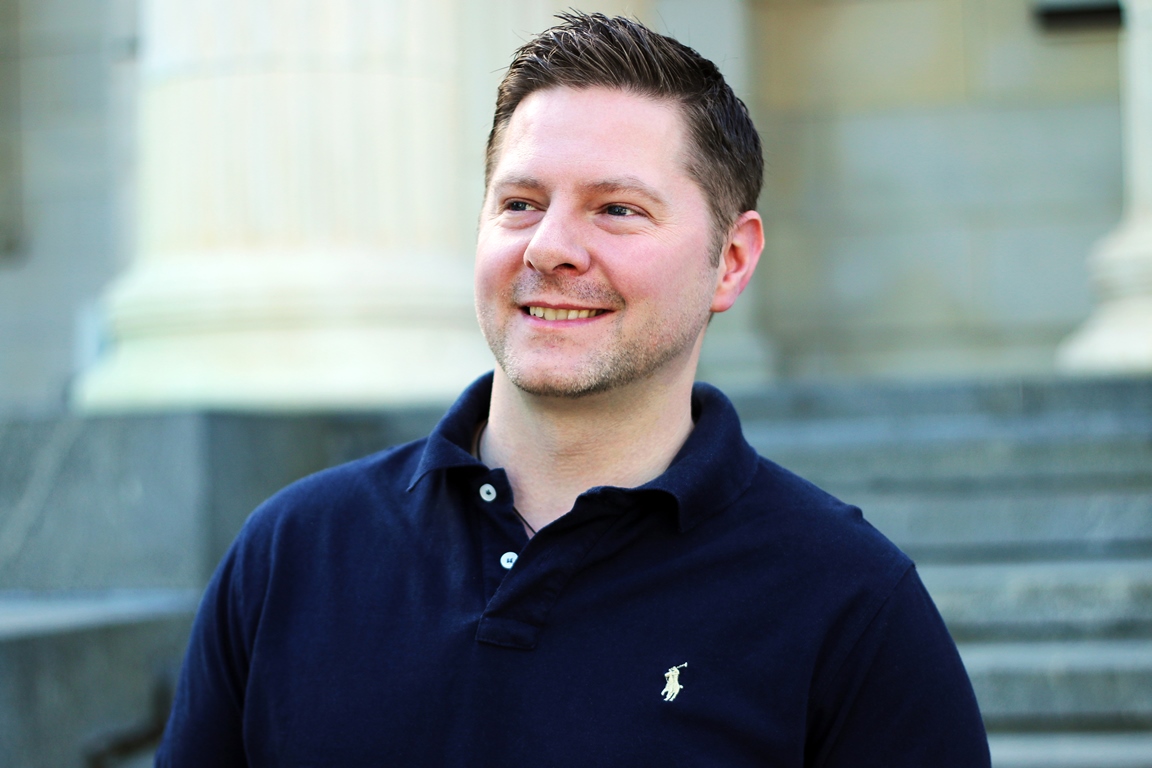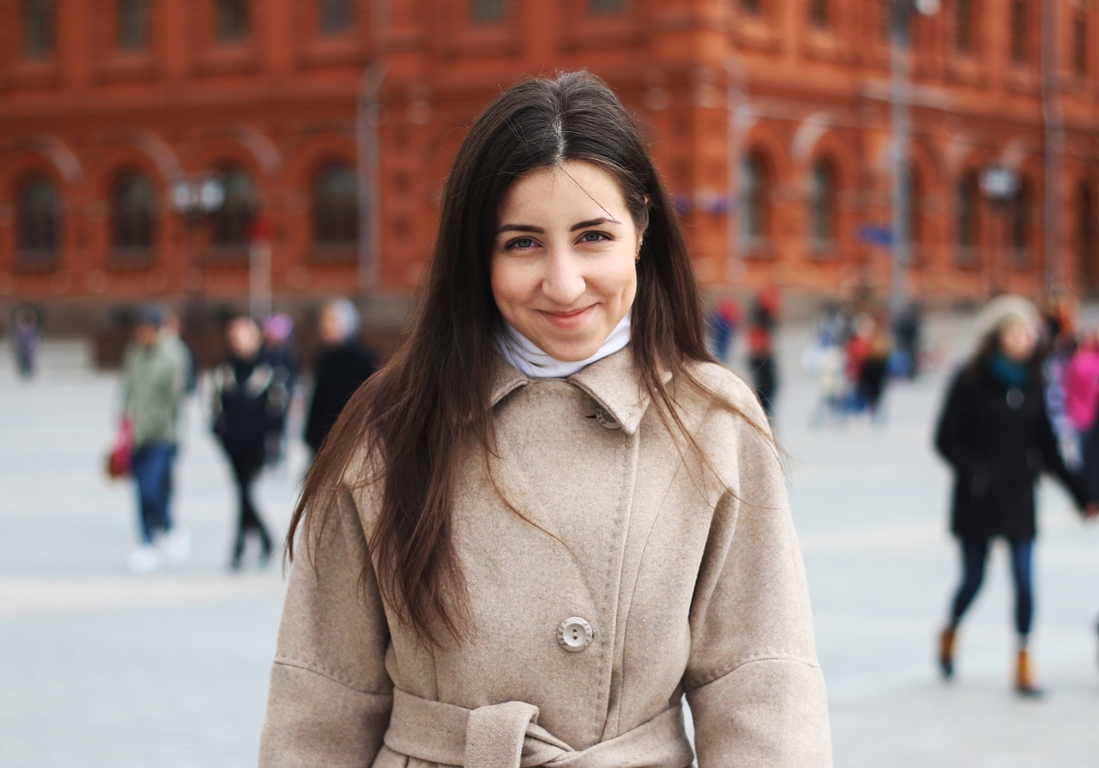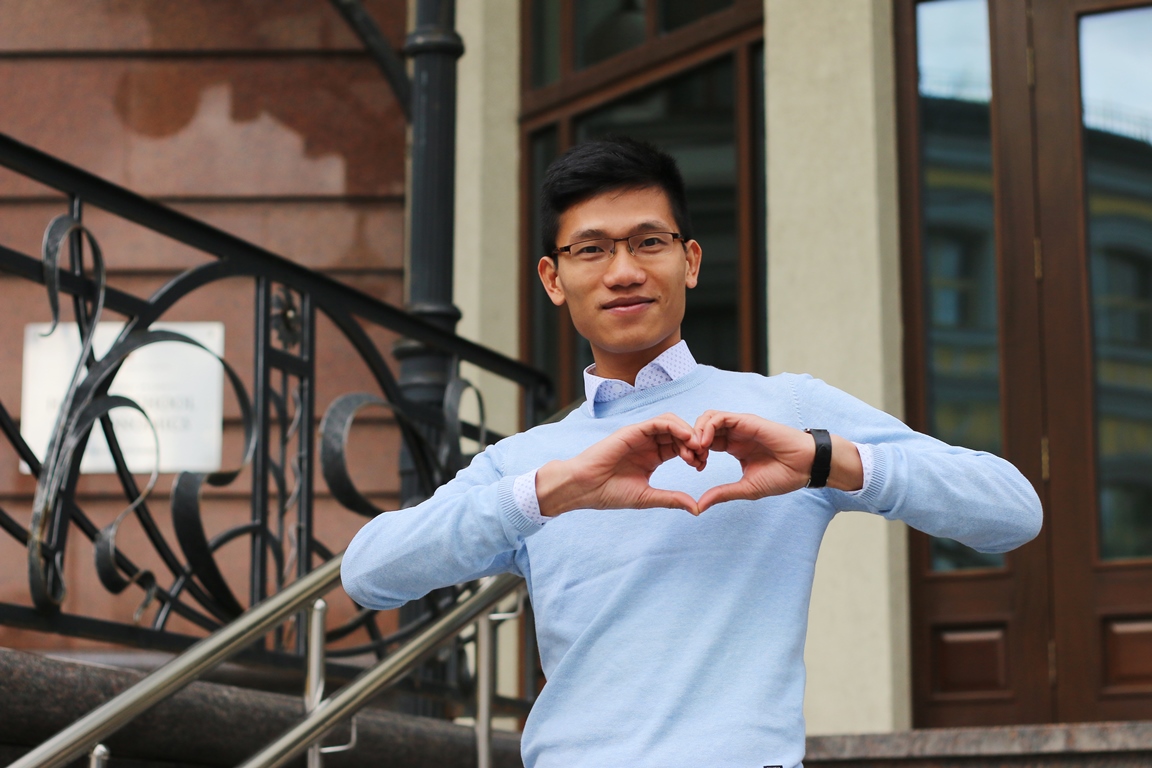International Perspective
On June 4, 2017, HSE is holding ‘The Whole World at HSE’ festival, dedicated to the cultures of different peoples. It’s a great opportunity for many international students to share information about their country’s culture and explain how Russian culture might be perceived by people with a different mentality. HSE international students and faculty have shared their views on both their and our respective cultures.

Alejandra Santoliva (Ecuador), student of the Master’s programme in Political Analysis and Public Policy
I came to Russia because of my Russian husband. Four months later, I realized that I wanted to study here, although the climate is quite unusual for me. I found HSE, as it was among the top universities in various global rankings. I chose an interesting Master's programme and made an application. I have always wanted to study political science and human rights in Moscow - a city of controversies in regards to these issues.
I’m used to the fact that, in South America, people almost always smile. They are almost always ready to laugh and open to communication. People in Russia are often too serious. I even researched this issue and found out that Russian people think that you may be a fool or a trickster if you smile for no reason. I decided not to hide my smile, because I was used to it and I found out that many people like it. HSE has helped me a lot to adapt here – everyone is very polite and sociable, both students and professors are willing to help, friendly faces are everywhere, and there are a lot of intercultural activities that help to retain your identity.

Tadamasa Sawada (Japan), Assistant Professor at the Faculty of Social Sciences (School of Psychology)
I don't know much about Russian students, but there is one thing I know about HSE students – they are very smart. And the reason I decided to start work here is that I really want to work with intelligent students.

Patrick Whelan (Canada), second-year student of Master's programme in Population and Development
I’ve lived all over the world, and was always interested in Russian culture, so I decided to give it a real try by studying here for two years. On top of gaining experience to Russian culture, being able to live and study in a beautiful city like Moscow is a real bonus. I chose HSE because everything I read said that HSE was a top university. However, my choice was mainly dependent on the programme and the Master of Population and Development sounded exactly like I wanted – and it didn’t disappoint. And, of course, getting a scholarship to study for free was also a major factor.
Having lived and traveled all over the world, I enjoy immersing myself in foreign cultures. As a Canadian, all the Russians I met seemed very happy to meet and talk with me. I found Russians to be very warm, intelligent and friendly people, often with strange and interesting hobbies. I didn’t encounter too many difficulties as a foreign student in Russia, but from what I’ve heard from others, it takes some getting used to. I am from Canada, so the weather is not so strange for me, but I know that many non-Russians find the long winter to be quite depressing.
I love my programme. In the Master of Population and Development, I feel like I learned how the world works, and so many things that I have seen around the world make more sense to me now. I also love our professors. They are passionate in what they do and they seem very hands-on and approachable making it easy to make connections with them. Thirdly, I love the opportunities that have been available to me at HSE. Every week we are being notified of summer schools, events, guest lecturers, job and volunteer opportunities, etc. In my time at HSE I have presented in two international conferences, have started a research group, have hosted several conferences, have been connected to an NGO for volunteering, and went to Italy for a 2 month internship, all supported by HSE. And, finally, I love the location. Being able to study in the beautiful heart of the city on Myasnitskaya Ulitsa made every day a joy as I traveled to class.
I believe that my education at HSE will give me many benefits. Not only did I learn how the world works through my program, which will benefit me in everything that I do, but the experience of living and studying here, in one of Russia’s top universities will give me stories for a lifetime and impress recruiters and academics in my future applications. Also, as an older student who has been out of academia for a while, the approachability of the professors have helped to mold me into an effective researcher and writer, which will also benefit me in all of my future endeavors.

Renira Gambarato (Brazil), Assistant Professor at the Faculty of Communications, Media, and Design (School of Media)
HSE students speak English very well and they always listen to you with much interest. They don’t hesitate to engage in discussions and can be very dynamic.
I'm Brazilian, but for several years I’ve been working abroad. Before HSE, I worked at Tallinn University and I met my future colleagues at a conference. They are amazing people and I wanted to start working here.
Teaching is also intensive training for a lecturer, especially in terms of immersion in local culture. I have studied the Russian media landscape, and the relationships among people are unique and based on respect and cordiality.

Anastasia Dulskaya (Pridnestrovian Moldavian Republic), student of the Bachelor’s programme in Philosophy
I knew that in my country I wouldn’t receive the right education. In addition, I tested myself by applying to HSE via a quota scheme, as staying home under my parents’ wing would have been too easy. As a result, I managed to get into such a great university.
The culture of Transnistria doesn’t differ much from Russia’s. However, I always learn something new about Russia and other cultures, because HSE contributes greatly to the convergence of different traditions by arranging various intercultural activities and introducing students from different countries.
HSE provides opportunities for development in any area. In addition, numerous career fairs held at the University prepare students for adult life as specialists and teach them how to establish themselves on the labour market.

Giang Dinh (Vietnam), first-year student of Master’s programme in International Relations: European and Asian Studies
My destiny brought me to Russia. During my studies in Vietnam, I dreamed to study abroad in one of Western countries. One day I found information about a scholarship fully funded by the Government of Russia. That was such a good offer. Thus, I decided to apply and got it. After five years of studying in a Bachelor programme in Kursk I am now doing my Master’s at HSE. I can say that receiving an education in Russia is one of the best choices I have made in my life.
I chose HSE because of its high quality of training and research. Currently, I am studying International Relations, which is ranked in Top 50-100 by the QS – World University Rankings this year.
When I just arrived in Russia, I did not know anything about Russian language so I could not communicate with people. I think Russian language is the most complicated challenge for any foreign student. Russian language is very beautiful but difficult to learn. Besides, I was homesick and experienced cultural shock (for example, ‘keep smiling’ is not good idea). That time was hard. After living in the country for some time, I got to understand the people well and adapted to their culture. Last semester I applied the course ‘Exploring Russian Culture’ organized by HSE and Russia beyond the Headlines and learnt many new interesting things about Russian traditional and contemporary customs and manners that I never knew before.
I really like studying at HSE where I can meet many leading Russian scholars. All of professors and lecturers are very kind and always willing to help any student who needs to do research. Moreover, my Russian friends are very polite and patient. They help me understand more about the subject of the lectures, which improves my knowledge of Russian language in that subject. Thus, I feel that the university has a very supportive and motivating environment. During studies at HSE, I learn and practise my skills in applying methodological approaches to international problems, expand my academic and professional contacts and understand deeply different cultures. These things will help me much to find a good job in the future.

Mark Taylor (Great Britain), Research Fellow at the Faculty of Humanities (School of Philology)
I haven’t had any problems about being non-Russian teacher. Actually, I have never felt this way. My colleagues and students speak very good English. So, I am now speaking Russian better and better, which has positively affected my life outside of the University.
Before I obtained a degree, I had already worked in Moscow as an English teacher. So, I was happy to be back here, at one of the best universities. HSE has helped me to develop my teaching skills and research career.

Tsolmon Baldan-Osor (Mongolia), student in Bachelor’s programme in Psychology
From a young age, as far as I remember, I always watched Russian television. I also ended up graduating from Mongolian-Russian joint school. So, it was quite obvious that in the future I would study in Russia. Not only because of this but I also wanted to get my Bachelor's degree in Russia because I think that studying in the language that you're most fluent in will be better for me. When HSE hosted Olympiads at my school, I learned about this academic institution. At first, I wasn't really interested, but then I did some research and became quite intrigued with HSE and wanted to study here.
At the start, I thought that it wouldn't really be that hard for me to study in Russia, but as time passed I began to notice the differences in people’s ways of thinking, culture and opinions. Nonetheless, students and teachers here are really considerate, so it hasn’t been too hard on me. There is a buddy system, which has been set up to support and provide help to foreign students. This club has hosted many interesting and fun events, which have helped me in learning new things here. As for the difficulties I’ve encountered, first of all, there’s the language barrier. I do understand what people are saying, but my speaking is a bit lacking. Because of this, I couldn't make friends and I was quite stressed about it. It was also quite hard to adapt to the new environment. This is because, even though Mongolians and Russians are not that different in culture, there are still some differences and, therefore, it was hard to adapt to this new situation. As I'm foreign, I don't often understand the references that other students make and it sometimes this makes me feel left out. Besides, I stay at the dormitory where I share a room with two other girls. So, it was quite hard to share a room with two strangers at first, but they're really nice and it turned out to be not that bad after all.
HSE is one of the top universities in Russia. At HSE, you can study a minor in a subject area that can complement your major. After we graduate, we will have a major and minor, which is really a great opportunity for students. Also, HSE has many other supplementary subjects, which students may choose to study and have them included in their transcript. HSE also has an online library that students can use to read articles from popular research magazines. I also like that we can have IELTS preparation classes and English for Specific Purposes. So, HSE offers us students many different opportunities.
Furthermore, I really like the LMS system (learning management system), where teachers post books that you may need, assignments that you have to complete so you don't need to always ask your teachers. HSE also has many clubs that you can join and these clubs actively host events and games that are both interesting and fun. There are also many other events hosted by companies or by HSE, which may offer many opportunities with respect to both your career and studies. Also, I quite like the lessons because teachers at HSE are really knowledgeable and they teach us both theoretical and practical ways of interpreting what we have learned. However, there's one thing that I'm bad at - it's active participation in lessons. I prefer to listen rather than talk and my speaking is a bit lacking in this regard. As such, this became a bit of a problem for me, but over time I have gradually adapted to this situation.
Photos by Ekaterina Nikolaeva and Elena Lenchukova (The Vyshka)
Renira Gambarato
Tadamasa Sawada
Mark Robert Taylor
See also:
'HSE is Now Russia’s Largest Centre for Empirical Research'
Leonid Gokhberg, HSE First Vice Rector, Director of the Institute for Statistical Studies and Economics of Knowledge, spoke on his first steps in academia, working with foreign researchers, on foresight research as well as shared his thoughts on HSE research development.
'My Desire to Do Something Big Brought Me to HSE'
Irina Savelieva, HSE Tenured Professor, Professor in the Faculty of Humanities’ School of History, Director of the Poletayev Institute for Theoretical and Historical Studies in the Humanities, spoke on her deciding to work in academia, research and teaching achievements as well as her decision to join HSE.
'Our Task Was to Produce a New Generation of Specialists in Russia Who Possess Knowledge of Modern Economics and the Social Sciences'
Andrei Yakovlev, HSE Tenured Professor, Director of the Institute for Industrial and Market Studies, member of the Academic Council spoke on his path to science, business journalism and international relations, global migration of scientific staff, as well as shared his thoughts on HSE research development.
'Creating a Faculty of Philosophy at HSE – An Interesting Task'
Alexey Rutkevich, Doctor of Philosophy, Professor at the School of Philosophy at the Faculty of Humanities, Dean of the Faculty of Humanities, spoke on his foray into science, research interests, as well as shared his thoughts on a philosopher’s position in society.
'At HSE There’s a Close-knit Team Focused on Research'
Fuad Aleskerov, Tenured Professor and Head of the Department of Mathematics of the Faculty of Economics, Head of the International Laboratory of Decision Choice and Analysis, Chief Scientist at the Laboratory for Experimental and Behavioral Economics, member of the Academic Council, spoke on his foray into science, as well as shared his thoughts on the development of HSE and mathematics in Russia.
HSE Celebrates Anniversary Night
On November 27, HSE celebrated its 25th birthday with Anniversary Night (because an average birthday party would have been rather dull). The celebration featured an entire array of different activities, and HSE students themselves came up with the evening’s programme. Anniversary Night began with the finale of the Research Battles, and from 8:00 p.m. onward, the grand ‘Night’ festival by Ingroup CTC continued. To see and read more about how the event went, take a look at our coverage (photographs to be updated).
'A Person’s Importance Is Determined not by Their Position, but by the Results of Their Work'
Maria Yudkevich, Vice Rector, Director of the Institute for Institutional Research, Associate Professor in the Faculty of Economic Sciences, Head of the International Research Laboratory for Institutional Analysis of Economic Reforms, and member of the HSE Academic Council, spoke on her path towards academia, research projects and achievements, as well as shared her thoughts on HSE research development.
‘Stolen Wheels’ to Serve the Good Turn for HSE
The results of the 'Steal the Wheel’ Competition have been decided. Entrants suggested implementing some useful practices at HSE that had proved their efficiency at other Russian or international universities, with the winners receiving their prizes at the beginning of December. The winning projects include new approaches to writing theses, organising space in classrooms, and submitting reports on academic trips.
'HSE Was Able to Become a Success in a Short Period of Time'
Oleg Ananyin, Tenured Professor, Professor in the Department of Theoretical Economics (Faculty of Economic Sciences), Academic Supervisor of the ‘Politics. Economics. Philosophy’ master’s programme, Chairman of the Education and Teaching Methods Council, Member of the HSE Academic Council, spoke on his academic interests, as well as shared his thoughts on the development of HSE and Russian economic community.
HSE Opens an Exhibition at Khitrovka on History of the Place
This exhibition has become part of the Open University project and is held on the HSE’s Anti-versary. It covers the history of Khitrovka and its surroundings, and offers a historical view of each object.


